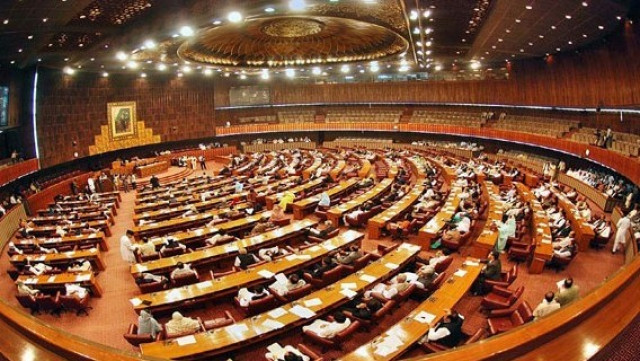Sindh, Seraiki lawmakers complain of water shortages
Lawmakers from Sindh and southern Punjab complained about acute water shortages and called for immediate remedial measures.

Legislators from southern Punjab alleged that their region is being denied its share of irrigation water by “influential landlords in the central parts of the province” in connivance with provincial authorities.
Speaking to the National Assembly on a point of order, a lawmaker from the Seraiki belt called for the induction of a separate member from the area in the Indus River System Authority (Irsa).
“There should be a separate member from southern Punjab in Irsa. That’s how the region can get its due share of water,” demanded PPP lawmaker Jamshed Dasti.
Dasti said the cotton-rich Seraiki region was being discriminated when it came to water distribution under the Irsa framework. “We seek justice, our right…this will strengthen the country and the federation,” Dasti argued.
His point of view was endorsed by another PPP legislator from Multan, Nasim Akhtar Chaudhry, who also urged the government to lift the ban on installing agricultural tube wells in the region.
Minister for Water and Power Raja Pervez Ashraf was directed on Tuesday to take notice of water shortage in canal tail areas in Sindh. The directive was issued by Nawab Abdul Ghani Talpur, who was chairing the National Assembly session on a point of order of Zafar Ali Shah. The lawmaker said that the shortage is affecting several districts in Sindh, including Badin, Tharparkar, Sangarh and Hyderabad.
He said that farm tax was already in place in the form of agriculture income tax and land tax. “These taxes are being paid in addition to charges on inputs, including water,” he added.
Commenting on a different issue, Marvi Memon said the government had not fulfilled the promise of giving priority to the locals in jobs at the Port Qasim.
Responding to a point of order, Minister for Ports and Shipping Babar Khan Ghauri said all private companies operating at the port were recruiting locals.
“However, when local people do not meet prescribed criteria, the companies have to give jobs to non-locals,” he said.
Suicides
The National Assembly was informed that over 200 people have committed suicide in the past year.
Responding to a call-attention notice of PML-N’s Chaudhry Barjees Tahir, Minister for Human Rights Mumtaz Gilani said 113 people have committed suicide in Punjab, 56 in Sindh, 15 in Balochistan and 20 in Khyber-Pakhtunkhwa.
The minister said the government was trying to bring about positive change in the lives of the poor through Benazir Income Support Program (BISP).
The minister, however, blamed the recent wave of suicides on long periods of dictatorships, which he said was snatching the zeal to live from people.
PPP member Palwasha Khan moved a private bill, seeking amendment to the Political Parties Order of 2002 in a bid to enable people from the middle-class to participate in the electoral politics.
The amendment, if approved, would bind all political parties to award at least 25 per cent of their tickets for the national and provincial assemblies to people belonging to the middle class. The bill was referred to concerned committee of the house.
Grey telephony
The government also did not oppose another private bill by several opposition members, calling for a law to define grey telephony, a technique through which telecommunications companies earned billion illegally.
Submitted by five Pakistan Muslim League - Quaid members, the bill sought amendment in the Pakistan Telecommunication (Re-organisation) Act of 1996.
Nawab Ghani Talpur urged the government to probe the explosion of the gas cylinder tanker in Hyderabad.
Published in The Express Tribune, June 30th, 2010.



















COMMENTS
Comments are moderated and generally will be posted if they are on-topic and not abusive.
For more information, please see our Comments FAQ